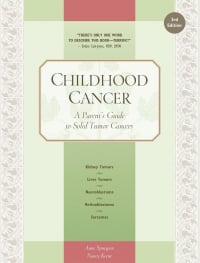Childhood Cancer
Making a decision about treatment
Treatment for children with solid tumors is evolving. The information gleaned from second opinions or your own research may reinforce what your doctor recommended, or it might provide you with additional treatment options. Either way, the information may increase your comfort level during the treatment planning process. You might want to ask your child’s treatment team the following questions about the suggested treatment plan:
• Why do you think this treatment is the best option? What are the other choices, and why are you recommending this one?
• Have you consulted with other doctors? If so, with whom? Did you all agree on this treatment or were other options suggested?
• Is there a standard treatment for this type of relapse? If so, what is it?
• Are any clinical trials available?
• What are the potential benefits and possible side effects of the proposed treatment?
• How long is the proposed treatment?
• If radiation is to be included, what type and dose are you recommending?
• What are the known or potential risks of the treatment?
• How often will my child need to be hospitalized?
• If the treatment is investigational, is there scientific evidence that it works for my child’s type of tumor?
• If we need to transfer to another treatment center for some or all of the proposed treatment, who will help us manage that process?
• Does insurance cover this type of treatment?
• What supportive services are available? How do we contact the people responsible for these services? (Contacts might include a hospital school coordinator, social worker, psychologist, and physical therapist.)
• What is the goal of this treatment? Remission? Comfort?
When older children and parents disagree about how to proceed, you can ask the primary nurse practitioner, social worker, or psychologist to help your family talk about the options. These discussions will help clarify each family member’s thoughts and feelings and will allow the child’s emotional and physical well-being to be part of the equation.
After my son relapsed, we set immediately back to work trying to determine what the best treatment option for him should be. His oncologist was very committed to making him well again. As it turned out, the best option was a phase II study drug that wasn’t yet available in our area. The hospital social worker helped us with travel arrangements and accommodations, and within a day we were on a plane headed for another hospital. Meanwhile, the oncologist completed all the necessary paperwork so that by the time the next course of chemotherapy was due, it could be administered at our own hospital. It was obvious to us from the very beginning of relapse that we had a wonderful medical team that was dedicated to helping our son get well again.
Unfortunately, after two courses of chemotherapy, it was clear that the drug wasn’t getting rid of the cancer. Once again, we all rolled up our sleeves and tried to find another treatment that might help him. I would gather the information and then his oncologist and I would sit and review all the data. As long as the therapy was reasonable and had the potential to help without further diminishing his quality of life, it was worth considering. One of the most comforting things that my son’s oncologist ever said to me was, “I will always be in your corner.”
After you have set goals, received answers to all of your questions, obtained a second opinion if desired, and decided on a treatment plan, it is time to proceed. Your knowledge and experience may prove to be a double-edged sword. You have no illusions about the difficulties ahead because you have done it before, but you also will be strengthened by your ties to the cancer community, your comfort with your doctors and hospital routines, and your ability to work with the system to get what your child needs. Many parents shared how their child took the lead with relapse treatment. While the parents agonized, their child simply said, “Let’s just do it.” And they did.

I encourage people to try to keep things in perspective. Attitude is a big part of survival. As difficult as it is, try to maintain a good attitude and keep focused on the future. I always thought, “I have cancer, this is a bad thing, but I am going to beat it.” My analogy was a boxing match. When I relapsed, I was knocked down. But I always got up and kept fighting.
I had a total of three relapses, two of which were on treatment. Every time we relapse, statistics say our chances of survival are less likely. But I survived those three relapses, and now I live a life as normal as if cancer never touched it. After cancer, I finished high school and went to college. I gave birth to a beautiful, healthy baby girl. My daughter (still beautiful) is now 7 years old. For me, life does go on after cancer.
Table of Contents
All Guides- Introduction
- 1. Diagnosis
- 2. Bone Sarcomas
- 3. Liver Cancers
- 4. Neuroblastoma
- 5. Retinoblastoma
- 6. Soft Tissue Sarcomas
- 7. Kidney Tumors
- 8. Telling Your Child and Others
- 9. Choosing a Treatment
- 10. Coping with Procedures
- 11. Forming a Partnership with the Medical Team
- 12. Hospitalization
- 13. Venous Catheters
- 14. Surgery
- 15. Chemotherapy
- 16. Common Side Effects of Treatment
- 17. Radiation Therapy
- 18. Stem Cell Transplantation
- 19. Siblings
- 20. Family and Friends
- 21. Communication and Behavior
- 22. School
- 23. Sources of Support
- 24. Nutrition
- 25. Medical and Financial Record-keeping
- 26. End of Treatment and Beyond
- 27. Recurrence
- 28. Death and Bereavement
- Appendix A. Blood Tests and What They Mean
- Appendix B. Resource Organizations
- Appendix C. Books, Websites, and Support Groups

